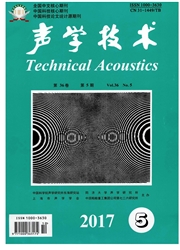

 中文摘要:
中文摘要:
噪声谱估计是单通道语音增强算法的关键步骤,当前大部分语音增强算法旨在提高语音质量,提高语音可懂度的算法却很少。在传统的单通道语音增强算法中,语音质量的提高往往是以牺牲语音的可懂度为代价的。对目前主流的几种噪声谱估计算法对语音可懂度影响进行分析。在不同噪声背景、不同信噪比情况下进行噪声谱估计,并采用谱减法对含噪语音信号作去噪处理,对比分析不同噪声、不同信噪比下增强前后语音的短时客观可懂度(Short-Time Objective Intelligibility,STOI)值,最后根据信噪比,对比分析了不同噪声环境下,语音增强前后语音能量高于噪声能量的时频块所占比例。实验表明,相比其他噪声估计算法,最小统计(Minima Statistics,MS)算法由于保留了更多的以语音能量为主的时频块,使得去噪后的语音有较高的可懂度。
 英文摘要:
英文摘要:
Noise spectrum estimation is a key step in single channel speech enhancement algorithms. Most of current speech enhancement algorithms are designed to improve speech quality, however, algorithms for increasing speech intelligibility are few. The traditional speech enhancement algorithms improve speech quality, while sacrificing speech intelligibility. In this paper, classical noise spectrum estimation algorithms are evaluated for their effects on speech intelligibility. Noise spectrum is estimated in different noise environments with SNRs between ?9 d B and 3 d B. The spectral subtraction is thereafter used for speech denoising. The STOI(Short-Time Objective Intelligibility) value of the enhanced speech is computed. At last, according to the signal-to-noise ratio, the proportions of speech dominated time-frequency blocks under different noise environments are analyzed. Experimental results show that, compared with other noise estimation algorithms, the minimum statistics(MS) obtains high speech intelligibility because it retains more speech dominated time-frequency blocks after speech denoising.
 同期刊论文项目
同期刊论文项目
 同项目期刊论文
同项目期刊论文
 期刊信息
期刊信息
